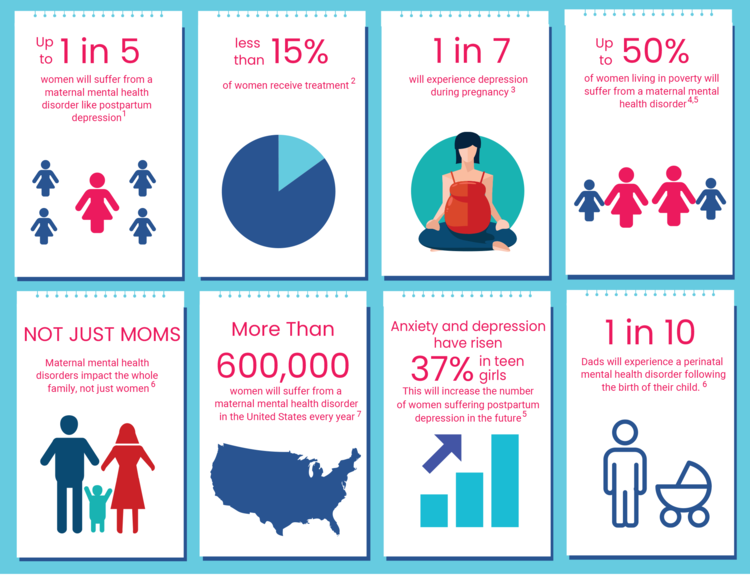 Annually in May, people celebrate Mother’s Day and honor maternal love, hard work and dedication by presenting handmade cards filled with tender sentiments, beautiful flowers, a breakfast in bed, a fun outing, or a special dinner. May is also the month that maternal mental health is recognized globally. The aim is to bring awareness to the mental health challenges – such as postpartum depression – that mothers and families face surrounding the birth of a child.
Annually in May, people celebrate Mother’s Day and honor maternal love, hard work and dedication by presenting handmade cards filled with tender sentiments, beautiful flowers, a breakfast in bed, a fun outing, or a special dinner. May is also the month that maternal mental health is recognized globally. The aim is to bring awareness to the mental health challenges – such as postpartum depression – that mothers and families face surrounding the birth of a child.
“Pregnancy, childbirth and the postpartum period isn’t always amazing, and it isn’t all rainbows,” shares Saira Kalia, MD, and director of the Banner-University Medical Center’s South Campus Perinatal Psychiatry Clinic. “Some women aren’t excited about being pregnant. It may be an unintended pregnancy, 51% of pregnancies are unplanned.”
The challenges prospective and new mothers face are huge, and not often talked about. “The biological, hormonal, and psychological shifts are enormously taxing” explains Dr Kalia. “Other than the obvious physical changes during pregnancy, there is an ongoing psychological toll. Becoming a mom is an identity shift that we aren’t always prepared for. Childbirth can be traumatic, and the postpartum period can be far from Instagram worthy. We don’t often talk about the hemorrhoids or clogged ducts but the pain is real, both physical and psychological. Sleep loss makes everything worse. As all of us can relate we feel more like ourselves after a good night’s rest. This becomes a challenge both in pregnancy and after.”
Additionally, the responsibilities can be overwhelming because “every decision you make becomes layered with other people’s opinions, and there are these voices telling you, ‘You should be a good mother’ but everyone’s definition of a good mother is different. When a mother doesn’t feel like all of this is a blessing, there’s a lot of guilt and shame from societal expectations,” Dr. Kalia shares.
Another challenge new mothers and families face is the lack of structured support. “In the United States, 64 percent of married-couple families with children had both parents employed. This is a high number when you think about things like family life, childcare, paid parental leave. The lack of paid parental leave is also a major social factor affecting maternal mental health. Both parents need time to bond with the new baby and families need time to find their new flow.
“Women are uniquely affected in the U.S. as one in four children are being raised by single women. Add in the wage gap, higher unemployment in women with children, less support, the cost of childcare, and you have a recipe for distress.”
All of these factors can lead to depression and anxiety or exacerbate preexisting mental health issues. The good news is that help is available, and a paradigm shift is occurring. “In some ways, society has evolved when it comes to mental health discussions,” says Dr. Kalia, “which allows for normalizing these conversations; having these discussions is getting easier.”
Dr. Kalia explains that the first course of action is to seek evaluation. If the individual meets the criteria for clinical depression or anxiety, then a treatment plan can be made tailored to their unique situation.
“I have personally found that moms respond very well to therapy and are quite motivated. Medications get a bad rap sometimes, which is quite sad as they can be very helpful. There are a number of safe, effective medications that can be used during pregnancy and breastfeeding.”
Another highly impactful tool is connecting with a support group. Dr. Kalia says a key thing to do is to find a support network with similar parenting philosophies. There are in-person and online groups (see resources below) that can help new parents know they aren’t alone. The struggles are starkly real. And so are the amazing women that fight to overcome these challenges.
“Women are amazing to work with, they are motivated and engaged and they do what needs to be done to get better for themselves and their families, that’s what’s always been awe-inspiring to me in doing this work.”
Resources


